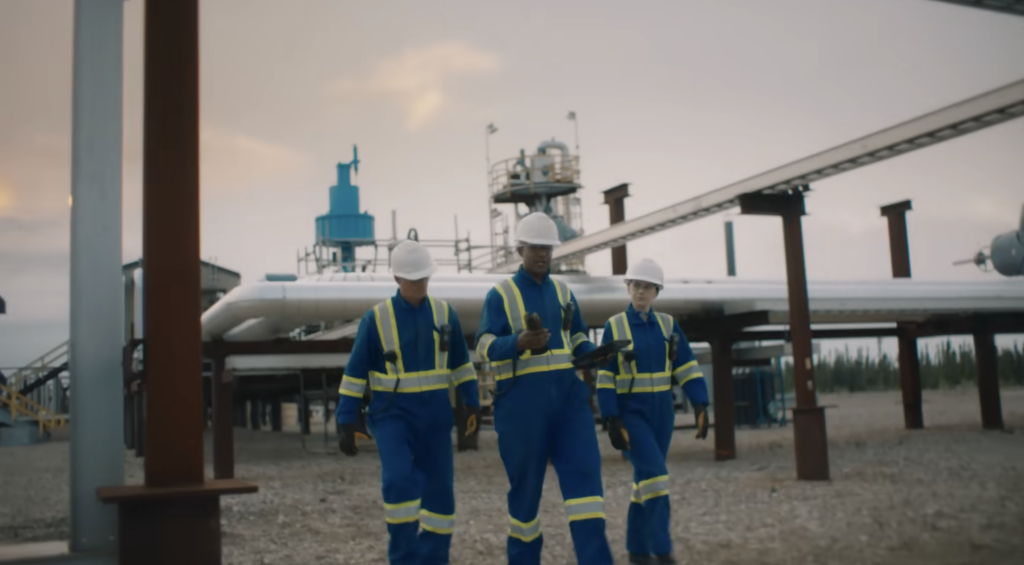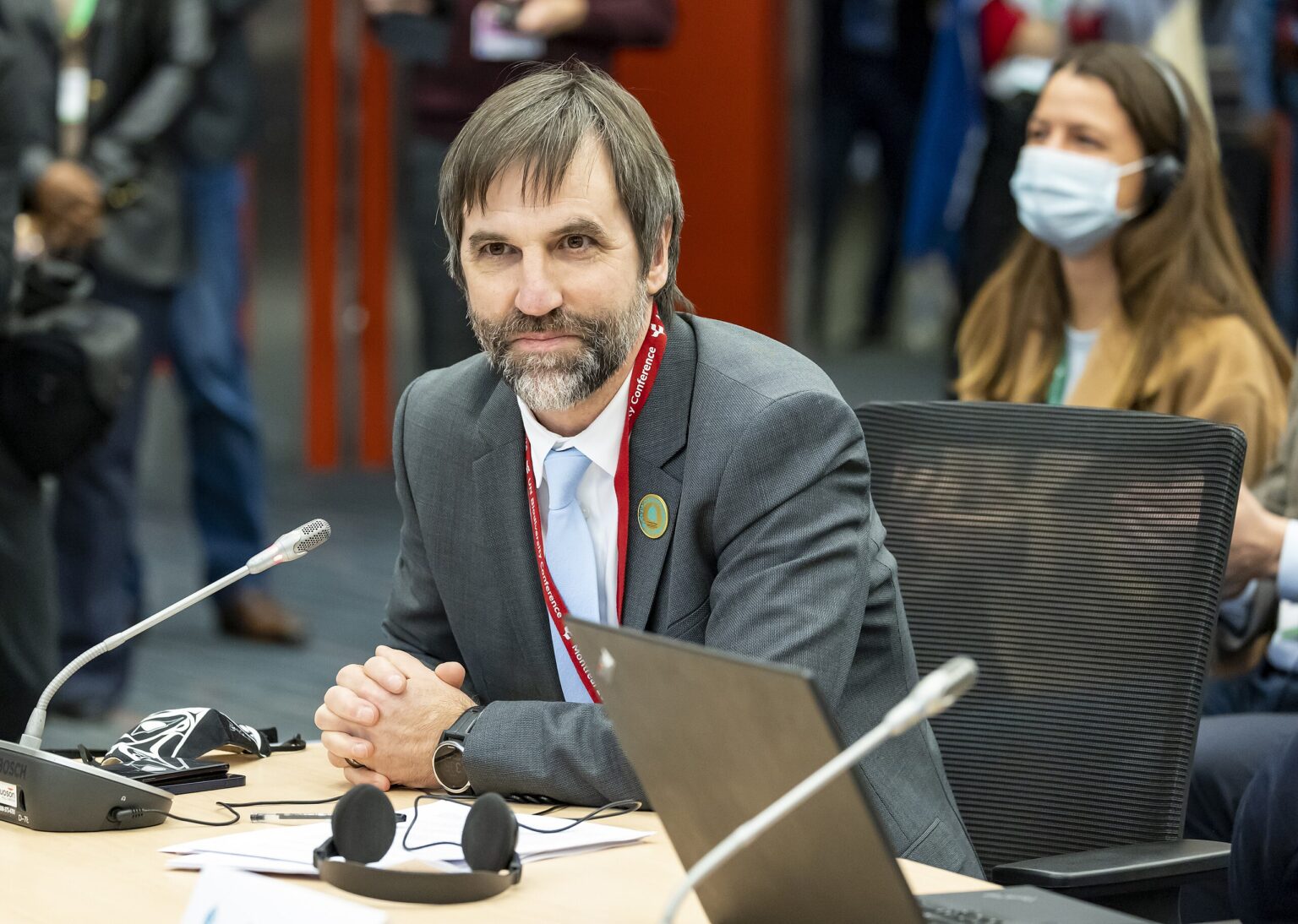Steven Guilbeault came to the COP29 climate change negotiations in Azerbaijan ready to make what the federal Liberal government deemed a “major” announcement.
The Canadian minister of environment promised a financing platform worth more than $2 billion which can help developing countries prepare for the worst impacts of climate change and shift their economies to cleaner sources of energy.
But though a rapid acceleration of climate finance – sometimes referred to as climate reparations – is badly needed, Canada is set to undermine that goal back home by potentially funneling billions of dollars to oil and gas producers at the heart of the climate crisis.
Behind the scenes, oil patch lobbyists are apparently hard at work seeking expensive subsidies from the Canadian taxpayer.
In the last year Pathways Alliance, a coalition representing six of the largest oil sands companies, booked 78 meetings with almost 40 senior federal officials including the deputy prime minister, three ministers, three deputy ministers, six assistant deputy ministers, three chiefs of staff, seven members of parliament and two senators. The deputy secretary to the cabinet for clean growth had 38 separate meetings with lobbyists for the Pathways Alliance.
In 2023 Canadians were bombarded with Pathways commercials claiming their carbon capture and storage scheme would make the industry carbon neutral by 2050. Pathways ads aired during the 2023 Super Bowl and FIFA World Cup and their Facebook and Instagram ad spend was the third largest in Canada in late 2022.
The Pathways Alliance abruptly scrubbed most of their website and social media accounts in July 2024 and have since mostly ghosted the public they were so aggressively courting not long ago.
While the Pathways Alliance has been heavily promoting CCS as an effective way to reduce emissions, a recent underground leak of 8,000 tonnes of stored CO2 at the first commercial site in the United States raises serious concerns about the safety of these projects and the materials used to build them.
Behind Closed Doors
Are Canadians about to be surprised by another “good news” announcement that billions more in public money is being shoveled at the fossil fuel sector even as the climate emergency accelerates? As usual, taxpayers footing the bill for such giveaways will likely be the last to know. However, clues into industry’s latest expensive demands are trickling out in some conspicuous places.

The Globe and Mail featured an op-ed last month entitled “It’s time for Alberta’s oilsands to land the Pathways carbon project,” which suggests the Pathways Alliance was offered $10 billion in federal and provincial incentives that would cover about two thirds of the capital costs. Taxpayers are learning of these additional gifts to Big Oil — not through a public consultation — but in a newspaper article that asks, “when could there ever be a deal this good for Alberta’s energy companies again?”
This piece followed another Globe and Mail article about Pathways seeking billions from the Canada Growth Fund, citing “three sources familiar with the matter” but “not authorized to speak publicly about the negotiations.” In addition to the government covering over 60 percent of the capital costs, Pathways apparently wants carbon pricing guarantees backstopped by – you guessed it – the taxpayer.
More Payouts Coming
In what might be the dying days of the Trudeau government, the oil patch is seeking an expensive concession called carbon contracts for difference (CCfDs). If a future government eliminated carbon pricing – as Conservative leader Pierre Poilievre is promising to do – CCfDs would require Ottawa to pay any carbon credit shortfall potentially decades into the future.
Even if current carbon pricing stays on the books, the Globe reports that some companies are demanding that the $15 billion Canada Growth Fund guarantee prices higher than the $170 per tonne ceiling legally scheduled to be reached in 2030, creating yet another subsidy.
The oil industry is certainly on a roll, squeezing over $18 billion in subsidies from the Canadian government in the last year alone. While the fossil fuel sector’s stated business is extracting fossil fuels, a lucrative sideline has seemingly become mining the public coffers. According to a recent report by Environmental Defence, Ottawa has dumped at least $65 billion into oil and gas subsidies in the last four years, which would have “fully funded every major wind and solar project in Canada from 2019-2021 twelve times over.”
The $34 billion Trans Mountain Pipeline – entirely paid for by the Canadian taxpayer – came online this year with virtually no benefit to Alberta bitumen prices. Even if this boondoggle is ever sold to the private sector, the federal government will be out of pocket up to $18 billion due to woefully inadequate pipeline tolls. In gratitude, oil companies are currently contesting these tolls to lower them even further.
As for the Pathways project, even the Alberta government has ceased pretending that this enormously expensive carbon capture scheme will make the bitumen industry carbon neutral. In their recent $7 million “scrap the cap” ad campaign, Alberta is now equating the proposed federal emissions cap as a “production” cap. Does this mean that Canadians might be shelling out billions more in oil infrastructure that not even the Alberta government believes will work?
Taxpayers may soon learn what all those Pathways lobbying meetings were about. Expect more hints to be intentionally leaked to friendly media with the final shoe dropping in the upcoming federal fall economic statement.
A cynic might suggest that the oil patch is in a full court press to wring billions more in giveaways from the free-spending Trudeau government before their expected defeat in the next election, especially if this can be trussed up as a “good news” announcement to bolster their outgoing leader’s climate legacy. Everyone would be a winner in that dismal scenario – except of course the taxpayer and the climate.
Back at COP29, Canadian hypocrisy is rich indeed. Even if carbon capture of oil sands production worked perfectly, this multi-billion dollar bandaid – largely funded by taxpayers – would only deal with about 20 percent of ultimate emissions. The other 80 percent of downstream emissions from Canadian fossil fuels exported elsewhere in the world now exceeds our entire economy by 327 MT/yr – an amount more than the annual emissions from the UK or 190 other countries.
Canadian negotiators stand on the world stage seeking to exalt our climate reputation for $2 billion in international climate reparations while at home our government shovels nine times that amount annually towards the fossil fuel sector, making our already outsized contribution to this global crisis even worse.
Subscribe to our newsletter
Stay up to date with DeSmog news and alerts







